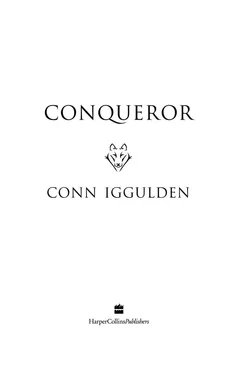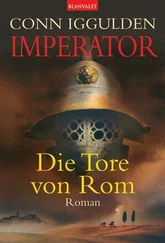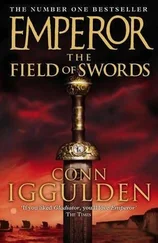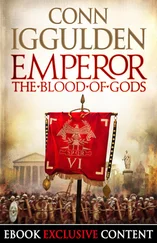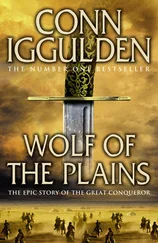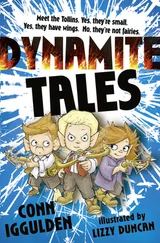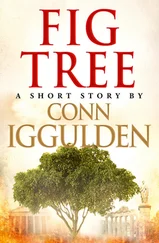‘Did you get me a skin of wine?’ he said.
‘Of course,’ she replied, ‘though I hope you will not leave it empty again and complain tomorrow about how your head is bursting. There will be no sympathy from me.’
‘I never complain!’ he said, wounded. ‘I am like a stone for keeping silent.’
‘Was that some other man stumbling around the ger this morning, then? Cursing and demanding to know who had stolen his hat? I thought it was you. In fact, I hope it was you, because he was very active last night, whoever he was.’
‘You were dreaming, woman.’
She grinned at him and flicked her long hair back from her face, working quickly with her hands to tie it. He stared deliberately at her breasts as they moved under the cloth and she snorted.
‘There is a fresh bucket of water at the door for you to wash, old goat. Don’t stay out here dreaming, so the food gets cold. I know you will complain anyway, but I will ignore you.’
She went inside and Kublai could hear her berating Zhenjin for stealing some of the pouches. Kublai chuckled to himself. When he had set out from Karakorum, he had not known how long it would take to reach the Sung lands. It was almost two years since Mongke had become khan and Kublai had spent a year of that simply travelling, moving his great host south, day after day. His tumans were with their families and there was no sense of impatience in their ranks. They did not need to stop to live. For them, the journey was as much their lives as reaching the destination. In the evenings, they played with their children, sang, gambled, made love, tended the animals or a thousand other small things that they could do anywhere. For a man who had lived most of his life in Karakorum, it was a strange thing to see.
Kublai had kept his oath to Mongke and not opened a single scroll or book since leaving the city. At first, it had been a terrible hardship and he had slept badly, dreaming of old texts. On the borders of Sung lands there were many signs of that ancient culture. They had already passed through hundreds of small towns and villages and Kublai had not been able to resist snapping up written works when he found them. His growing collection travelled with him like an itch at the back of his mind.
It had been Yao Shu who offered to read them to him in the evenings. Though Kublai was uncomfortable at skirting his oath, he could not deny it was a comfort. His son Zhenjin seemed to enjoy the droning voice and sat up late when he should have been asleep, listening to every word. Kublai’s mind had suffered like a desert in time of drought and the ideas poured in, reviving him.
His body too had toughened in the months of travel. Saddle sores were just a painful memory. Like the experienced warriors, he had developed a sheath of dark yellow callus on his lower spine, about the width of a man’s hand across. He reached behind him to scratch it, frowning at the sweat-slick that stayed on his skin no matter how often he bathed. Mongke could not object to his being clean, at least. Though he wore the scaled armour, Kublai suffered less with rashes and skin rot than his men. In the humid summer, a scent of bad meat overlaid even the odour of wet wool and horses. Kublai still missed the cool Chin robes he had grown to love.
The orlok of his tumans had a ger in sight of Kublai’s, with three women and a host of servants tending his every need. Kublai squinted to see Uriang-Khadai standing over one of them, giving some instruction about the best way to stitch a saddle. The orlok’s back was arrow-straight, as always. Kublai snorted to himself. He had already decided Uriang-Khadai was Mongke’s man, the khan’s eyes on their expedition. The orlok was an experienced officer of the sort who would certainly impress his brother. He had even scarred his cheeks to prevent a beard growing. The keloid ridges proclaimed that he put duty above self, though Kublai saw it as a sort of twisted vanity.
As Kublai watched, Uriang-Khadai felt the scrutiny and turned sharply to face him. Caught staring, Kublai raised his hand as if in greeting, but the orlok pretended he had not seen and turned away to his own ger, his own little world within the camp. Kublai suspected the man saw him as a mere scholar, given authority by his brother for no great merit. When they met each day, he could see Uriang-Khadai’s subtle amusement as Kublai laid out his strategies. There was little liking between them, but it did not truly matter, as long as he continued to obey. Kublai yawned again. He could smell his meal on the breeze and his mouth ached for wine to take the edge off his thoughts. It was the only way to ease his mind, to stop it tearing every idea to pieces and then making new things with the scraps. With a last look around him, he realised he could relax. Some of the tension left his shoulders and back as he ducked into the ger and was immediately ambushed by Zhenjin, who had waited patiently for him.
The tumans were never quite alone as they drifted south. With such a vast and slow assemblage, they could not possibly surprise the Sung nation. There were always scouts watching from the nearest hills. Word had gone ahead. The most recent villages were all abandoned, some of them with odd markings of blood in the road. Kublai wondered if the inhabitants had been slaughtered rather than left to give aid to an enemy. He could believe it. Though he loved the culture, he had no illusions about their brutality or the sort of armies his men would face. The Sung outnumbered him by hundreds to one. They had walled cities, cannon and flame weapons, good steel, crossbows and excellent discipline. As he trotted his horse, he listed their strengths and weaknesses as he had a thousand times before. Their strengths were intimidating, impossible. The only weaknesses he had been able to think of were that they had few cavalry and that they chose their officers for nobility of birth, or with written examinations in their cities. Compared with men like Uriang-Khadai and Bayar, Kublai hoped the Sung generals would also be considered effete scholars. He could beat scholars.
Out of the corner of his eye, he saw one of his scouts ride up to Uriang-Khadai and report. Kublai kept facing forward, though he felt his heart beat faster in anticipation. Four days before, the Mongol column had crossed the Sung border and begun to move east. Whatever the Sung armies had been doing for the months of his approach, they would have to respond. He had been expecting contact. He had done everything he could with their formations and battle plans, but all of that would change when he met the enemy at last. Kublai smiled as a memory of one book flashed into his mind. He did not have to read it again to know every line. He had memorised the work by Sun Tzu many years before. The irony of a book on the art of war being written by a Chin general was not lost on him. The Sung would know it just as well.
Uriang-Khadai rode slowly over to him, deliberately unhurried, though thousands of interested eyes watched the orlok’s progress. He reached Kublai and dipped his head formally.
‘The enemy are in the field, my lord,’ he said, his voice as clipped and dry as if he discussed the rations. ‘They have taken up a position on the other side of a river, some twenty miles further east and south. My scouts report two hundred thousand infantry and some ten thousand horsemen.’
His voice was deliberately unimpressed, but Kublai felt sweat break out in his armpits, stinging the scabs there. The numbers were terrifying. He did not think Genghis had ever faced so many, except perhaps at the Badger’s Mouth, far to the north.
‘If I may, my lord?’ Uriang-Khadai said into the silence.
Kublai nodded for him to go ahead, suppressing his irritation at the man’s pompous tone.
‘They could have attacked after we crossed the river, but with it still between us, I suggest we ride on. We can force them away from whatever traps and trenches they have dug. The Yunnan city of Ta-li is only another hundred miles south. If we continue towards it, they will have no choice but to follow.’
Читать дальше
Конец ознакомительного отрывка
Купить книгу
